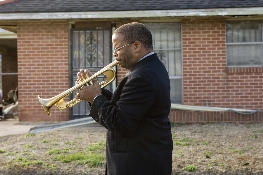 Tragedy awakens the need for something to grasp, something sturdy, reliable, and familiar. We saw this need after 9/11, with congregations growing within churches and other places of worship. We see this in times of war, especially in soldiers’–and their families’–reliance on prayer. Similarly, the second half of Spike Lee’s Hurricane Katrina documentary, “When The Levees Broke,” revealed just how much many New Orleanians depended on their religious faith to get them through this particular tragedy.
Tragedy awakens the need for something to grasp, something sturdy, reliable, and familiar. We saw this need after 9/11, with congregations growing within churches and other places of worship. We see this in times of war, especially in soldiers’–and their families’–reliance on prayer. Similarly, the second half of Spike Lee’s Hurricane Katrina documentary, “When The Levees Broke,” revealed just how much many New Orleanians depended on their religious faith to get them through this particular tragedy.
As the floods rose and the needed help didn’t come, many New Orleanians were overcome with anger, the predominant emotion that lingers today. In Lee’s documentary, interview after interview shows politician-bashing, government-cursing individuals who seem as if they’ll never be whole or happy again. They curse and threaten and vent their rage. But at the end of every angry outburst, it is God’s name that lingers on their tongues, and it is God who, in the words of one individual in the film, “gets all the glory.”
It doesn’t seem to matter that the hurricane came from nature, which most religious people presumably believe is controlled by God. These people do not curse God for their misfortune. Having lived nowhere but in New Orleans, most individuals in Lee’s film accepted hurricanes as a normal part of their lives. In dealing with the grief of Katrina and its aftermath, these people were surprisingly rational. No one blamed or cursed God, no one asked “Why us?” or “How could God do this?” Instead, it was state and federal governments to whom they directed these questions, and who were on the receiving end of the wrath that so many other people might blindly throw at God.
A large part of the Acts III and IV of the four-part documentary dealt with the moving-forward stage, nearly a year after the storm. In the most poignant segments from Lee’s four-hour film, citizens gathered in the streets and gave Hurricane Katrina a “jazz funeral.” A New Orleans tradition, jazz funerals are given not to mourn loss but to celebrate life. To watch these New Orleanians marching down the street, singing, dancing, and praying, was a religious experience in itself. A coffin draped with a sign bearing the word “Katrina” symbolized the survival of scores of New Orleanians–people who survived Hurricane Katrina and continued to survive living day-to-day with the memories of their loss. It was faith to which many New Orleanians clung when it was clear their government had forsaken them.

